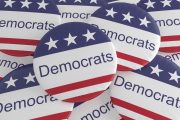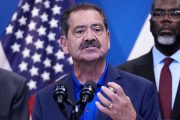Giving credit where credit is due, we must acknowledge that Donald Trump appears to be the only Republican presidential candidate willing to criticize the many entangling trade alliances America is now involved with or is preparing to become involved with. Trump has been a vocal critic of the looming Trans-Pacific Partnership (TPP), a sovereignty-sapping international organization touted as a vessel for free trade (what else?) across the Pacific, but which is in fact yet another attempt by internationalist elites to entangle the United States and other Pacific Rim countries in a regional-government-by-stealth along the lines of the former European Common Market (which has been transformed into the European Union).
Trump’s major beef with the TPP is not so much with the long-term prospects for regional government, but with its being “a bad deal for the United States,” leaving us on an equal footing with the likes of the Sultanate of Brunei.
Trump’s opposition to the TPP and also to longer-standing “free trade” agreements such as NAFTA has garnered him considerable popularity, much to the dismay of elites in both major parties, for whom the promulgation of international managed-trade agreements as precursors to regional government blocs has long been an important agenda item. So popular have Trump’s anti-trade bloc tirades been that GOP congressmen formerly supportive of the TPP, such as Ohio senator and GOP establishment insider Rob Portman, have reversed their positions.
No less an establishment organ than the New York Times has taken notice of Trump’s war on the TPP and other trade organizations. Pouted the Times’ Albert R. Hunt on February 21:
In this election season … Mr. Trump has set the agenda, and no presidential candidate is carrying a free-trade banner. He charges that America’s “political hacks and diplomats” have been taken to the cleaners on trade deals that have cost millions of jobs. He vows to undo Mr. Clinton’s North American Free Trade Agreement, dump the proposed Pacific Rim pact and go after Mexico, Japan and China on trade. He has suggested a 35 percent tax on cars imported from Mexico. He also advocated a 45 percent tax on imports from China. (He has denied that he made that proposal, but his words were captured on tape.)
Such statements horrify traditional Republicans. “Hearing this demagogue talk about a 45 percent tariff on Chinese imports is arrogantly insane, a clear path to the results of the old Smoot-Hawley Tariff of the ’30s — which made sure the Depression lasted for a decade,” said Bill Brock, a former Republican National Committee chairman and U.S. trade representative.
In other words, Donald Trump wants no part of the TPP, wants to get the United States out of NAFTA, and wants to begin levying (shudder!) tariffs, those bugbears of free traders that the American Founders intended be the principal source of revenue for the federal government. These are positions that ought to warm the heart of any principled constitutionalist and opponent of global government. It is doubtful that Trump is supporting such positions out of fealty to the Founding Fathers; he is much more a pragmatist than a constitutionalist. But regardless of motive, he is shining the light of public scrutiny on the extremely secretive TPP and on the baneful effects of our 20-year membership in NAFTA, and for that he deserves kudos.
And Trump isn’t only making trade a front-burner issue. Taking a page out of Ron Paul’s playbook, The Donald has begun calling for an audit of the Federal Reserve. On February 22, he tweeted: “It is so important to audit the Federal Reserve, and yet Ted Cruz missed the vote on the bill that would allow this to be done.” In an interview with Alex Jones, Trump campaign insider Roger Stone said of Trump:
He’s not a big fan of the Fed. He is scaring the central bankers; he is scaring the Washington/Wall Street/D.C. consultant/lobbyist class. He’s deeply suspicious of the Fed and I think he is open-minded about the Fed…. I’d suspect you’d get an audit of the Fed [with Trump].
We do not expect Donald Trump to become a full-fledged acolyte of Ron Paul anytime soon, but at this point, he is the only presidential candidate to even pay lip service to auditing the Fed or scaling back American participation in international trade bureaucracies. Should he be elected president, we hope that his words are prelude to actions.




